Contributing Experts: Khone Saysana, Lead Data Management and Clinical Data Science at Roche Diagnostics; Walter Stoettner, Principal Data Scientist at Roche Diagnostics; and Nicole Latimer, Chief Executive Officer, Medrio
Life Science companies are facing new challenges. Capital has tightened over the last two years, and global regulatory authorities are stepping up their evaluations of clinical data.
Amidst funding and regulatory challenges, more companies are seeking ways to improve and scale their research.
The answer? Standardization of electronic data capture for greater efficiency, higher quality data, and seamless scalability.
On average, Roche Diagnostics is running almost 200 clinical trials in over 60 domains. For more than 10 years, they have had a value-driven focus on standardization.
In this article, learn from Nicole Latimer’s discussion with Roche Diagnostics’ team members Khone Saysana and Walter Stoettner about:
- Why standardization is critical for clinical trials
- How to standardize data collection processes
- How to standardize across multiple sites
- What to consider when training for data standardization
- Why it’s important to embrace standardization beyond data
Watch the entire webinar on standardizing clinical trials to gain additional insights on leveraging economies of scale and enhancing productivity.
The Role of Standardization in Clinical Trials
Adhering to standardized data collection practices enhances reliability, consistency, and successful clinical trial outcomes. It also enables scalability through speed, quality, and cost efficiency.
Khone Saysana, Lead of Data Management and Clinical Data Science at Roche Diagnostics, explains, “In an era of increasing regulations and requirements, increasing study complexity, and the rising cost of clinical trials, standardization is critical for us.”
Benefits of standardization in clinical trials include:
- Ease of use for team members across sites
- Simpler interaction between sites
- The ability to do cross-monitoring or cross-comparison of studies
- Readiness for future scaling of research
“Regulations and study designs are constantly changing,” says Khone. “Standardization allows us to get a headstart on things and take the burden off our people as much as possible so they can focus on innovation.”
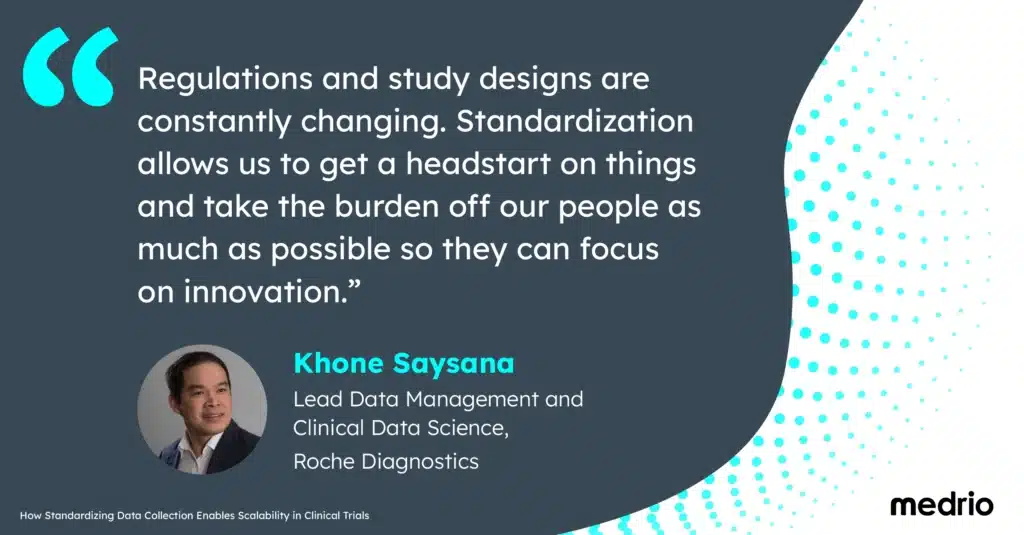
Standardizing Electronic Data Capture for Clinical Trials
Creating standardized clinical trial data collection processes requires an upfront investment of time and resources.
It can also be challenging to work with a large diversity of instruments, study design standards, and templates. However, a sharp focus on standardization smooths out processes and the implementation of technologies.
When it comes to a CDMS/EDC system, a sponsor can create efficiencies by embedding data standardization into their study-build processes and user acceptance testing.
Creating standardized electronic case report forms (eCRFs) that can be copied and reused without additional efforts reduces the time required for revalidating or retesting. Instead, only altered elements would need to be tested.
Study teams can then copy the required forms from their saved templates as needed.
Standardized CDMS/EDC processes for data collection include:
- Utilizing study-specific eCRF templates, when needed
- Developing and saving eCRF templates for later use
- Copying previous study builds
“It’s so easy to copy or replicate a template—and it significantly reduces the build time required for your next study,” notes Nicole.
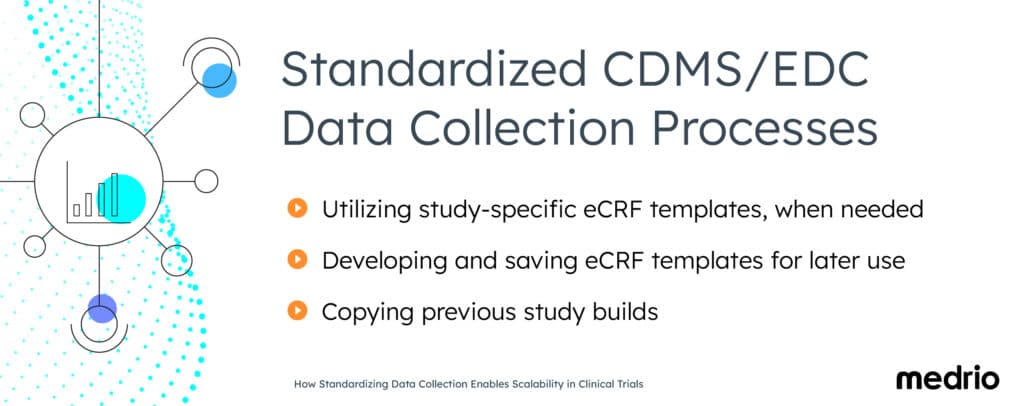
Creating Standardization Across Research Sites
As studies grow and scale, more sites tend to be involved. This potential expansion makes standardization from the start even more critical.
Standardizing across sites is a challenge. Every site has its own way of doing things. Different sites have different personnel. These differences are why pre-planning efforts are so important.
Pre-planning efforts can include:
- Study protocol development
- eCRF template development
- Training document creation
“We realized that the success starts with the study protocol and the eCRF development,” says Khone. “If you get those two correct, all of the other activities follow well.”
Pre-planning efforts can unify processes across sites. This tactic also helps timeline adherence.
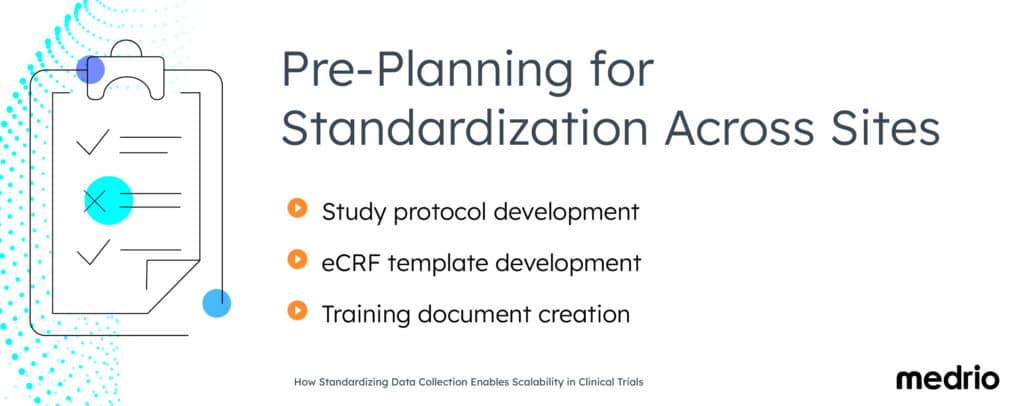
Clinical Data Standardization and Interoperability
As Life Sciences companies move from individual studies to looking at their research as a research platform, interoperability can support simplified cross-study analysis.
“We need interoperability amongst our systems because our studies are so diverse and complex,” says Khone.
Standardization leads to interoperability through:
- Enabling a seamless flow of digital data
- Supporting cross-study analysis
- Allowing for comprehensive monitoring reports
Roche Diagnostics uses interoperability to power their research platform, helping them get the most out of their research investments. It also helps to streamline their processes through automation, fuelling further innovation.
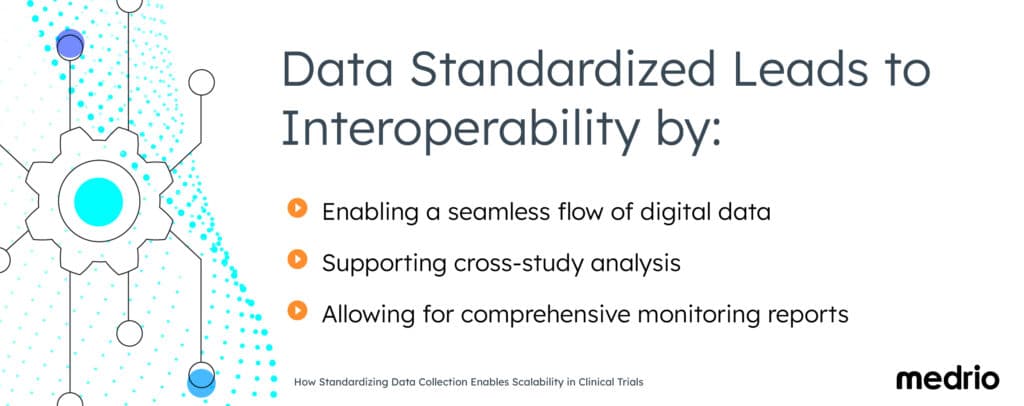
Training for Clinical Data Standardization
Implementing standardized processes requires predefined training.
Data managers must understand data standards and how to apply them. If standards are built based on CDISC standards, then data managers can get up to speed quickly.
Data managers can practice what needs to be done using hands-on sessions. For example, they can practice copying any eCRFs from the template library into their study.
When adequate training is provided, site staff also tend to request fewer updates to data entry guidance documents. Training also helps study teams and partners, like site managers and principal investigators become more familiar with processes and each other.
Training should include:
- Predefined training for all data managers on data standards
- Hands-on sessions to test out processes
- Internal standards aligned with CDISC standards
- Tailored training for specific sites
“[Standardization] allows our teams to get a jump-start and gives us a head start on programming and study startup activities,” says Khone.
Training material can be tailored for specific sites, as required. Then these site-specific training can be reused, sometimes even being applied to entire countries.
“The upfront investment in standardizing your system to create training materials that can be used repeatedly leads to efficiencies downstream,” summarizes Nicole.
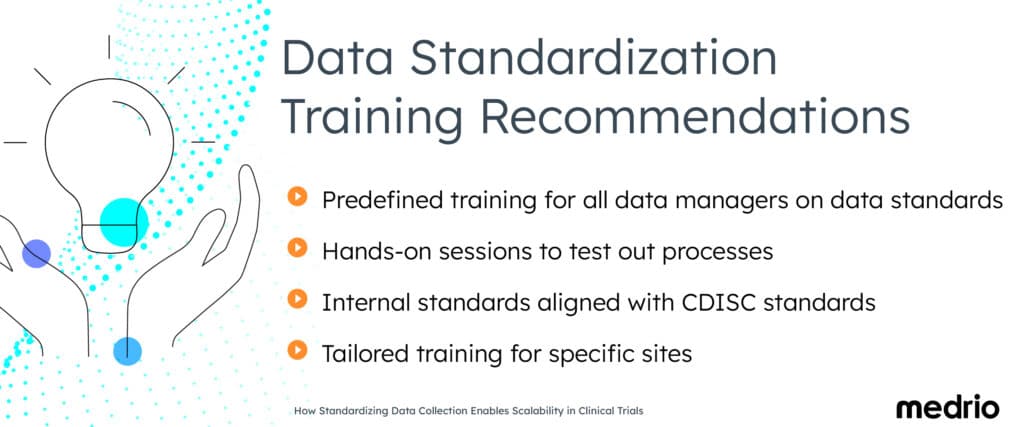
Beyond Data Standardization
Roche Diagnostics’ focus on standardization goes beyond data. Their teams use templates, not only for data collection, but also for general settings like permissions, data review, and monitoring steps.
“Our standards cover not only the EDC platforms,” says Walter Stoettner, Principal Data Scientist at Roche Diagnostics, “But also sample management and other systems where we manage our device data.”
“Standardization helps our teams be more efficient,” explains Khone. “It gives them more time to think about innovations and ideas, which is what we want to emphasize and improve.”
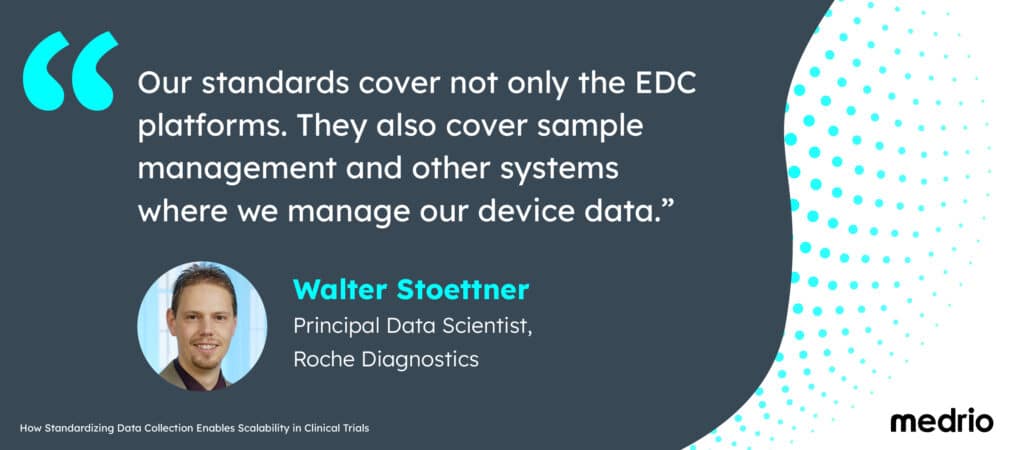
Fueling Future Innovation Through Standardization
Standardizing data collection not only boosts efficiency and enhances data quality—it also lays the groundwork for scalability.
By establishing uniform practices in data collection, sponsors can streamline processes, support interoperability, and prepare for future growth.
We only covered part of Khone, Walter, and Nicole’s conversation in this article.
Watch the entire conversation and gain additional insights about how Roche Diagnostics standardizes data collection processes to fuel innovation and scale your clinical trials.
